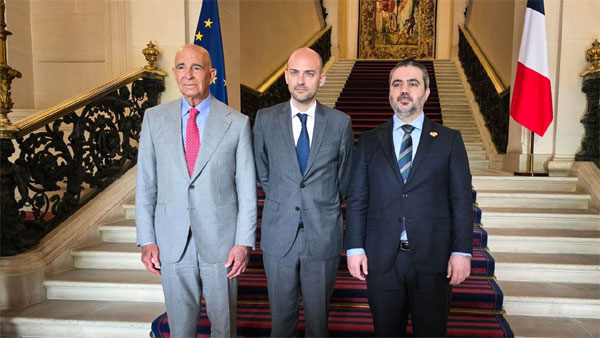Daijiworld Media Network - Damascus
Damascus, Aug 20: In a highly unusual diplomatic development, Syria’s Foreign Minister Assad Hassan al-Shibani held a direct meeting with an Israeli delegation in Paris to discuss de-escalation measures and regional stability in southern Syria, according to Syria’s state-run news agency.
The meeting, reportedly held with U.S. mediation, focused on several key issues, including reducing tensions along the Israel-Syria frontier, reaffirming the principle of non-interference in Syria’s internal affairs, and reviving the 1974 disengagement agreement, which has governed the military status of the buffer zone between the two countries for decades.
One focal point of the discussions was the fragile ceasefire in Sweida province, a restive area in southern Syria that has seen a surge in unrest. Both parties reportedly explored mechanisms for monitoring and maintaining the ceasefire to prevent further escalation.

According to Xinhua, quoting SANA, the meeting in Paris is part of a broader diplomatic initiative aimed at preserving Syria’s territorial integrity and promoting wider regional security amid shifting dynamics in the Middle East.
Earlier this month, al-Shibani met in Amman with Jordanian Foreign Minister Ayman Safadi and U.S. Special Envoy for Syria, Thomas Barrack. That meeting resulted in the formation of a Syrian-Jordanian-U.S. working group, designed to help uphold the Sweida ceasefire and support a broader resolution to Syria’s enduring political crisis.
This diplomatic push follows dramatic developments in December, when Israeli forces crossed into the UN-monitored buffer zone separating the Israeli-occupied Golan Heights from Syria. In the power vacuum left after the fall of President Bashar al-Assad's government, Israel reportedly seized control of the Syrian side of Mount Hermon, escalating tensions in the region.
The buffer zone, created under the UN Disengagement Observer Force (UNDOF) following the 1974 agreement, had served for decades as a relatively stable frontier until the recent flare-up.
While neither Israel nor Syria has formally confirmed the Paris meeting, SANA's disclosure marks a rare public acknowledgment of direct communication between the two longtime adversaries. The implications for regional diplomacy — especially with U.S. involvement and the shifting alliances post-Assad — remain to be seen.